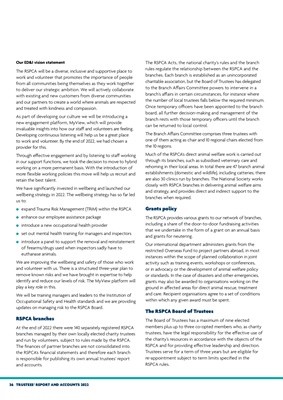
TRUSTEES' REPORT AND ACCOUNTS 2022
36 Our ED&I vision statement
The RSPCA will be a diverse, inclusive and supportive place to
work and volunteer that promotes the importance of people
from all communities being themselves as they work together
to deliver our strategic ambition. We will actively collaborate
with existing and new customers from diverse communities
and our partners to create a world where animals are respected
and treated with kindness and compassion.
As part of developing our culture we will be introducing a
new engagement platform, MyView, which will provide
invaluable insights into how our staff and volunteers are feeling.
Developing continuous listening will help us be a great place
to work and volunteer. By the end of 2022, we had chosen a
provider for this.
Through effective engagement and by listening to staff working
in our support functions, we took the decision to move to hybrid
working on a more permanent basis. With the introduction of
more flexible working policies this move will help us recruit and
retain the best talent.
We have significantly invested in wellbeing and launched our
wellbeing strategy in 2022. The wellbeing strategy has so far led
us to:
l expand Trauma Risk Management (TRiM) within the RSPCA
l enhance our employee assistance package
l introduce a new occupational health provider
l set out mental health training for managers and inspectors
l introduce a panel to support the removal and reinstatement
of firearms/drugs used when inspectors sadly have to
euthanase animals.
We are improving the wellbeing and safety of those who work
and volunteer with us. There is a structured three-year plan to
remove known risks and we have brought in expertise to help
identify and reduce our levels of risk. The MyView platform will
play a key role in this.
We will be training managers and leaders to the Institution of
Occupational Safety and Health standards and we are providing
updates on managing risk to the RSPCA Board.
RSPCA branches
At the end of 2022 there were 140 separately registered RSPCA
branches managed by their own locally elected charity trustees
and run by volunteers, subject to rules made by the RSPCA.
The finances of partner branches are not consolidated into
the RSPCA's financial statements and therefore each branch
is responsible for publishing its own annual trustees' report
and accounts.
The RSPCA Acts, the national charity's rules and the branch
rules regulate the relationship between the RSPCA and the
branches. Each branch is established as an unincorporated
charitable association, but the Board of Trustees has delegated
to the Branch Affairs Committee powers to intervene in a
branch's affairs in certain circumstances, for instance where
the number of local trustees falls below the required minimum.
Once temporary officers have been appointed to the branch
board, all further decision-making and management of the
branch rests with those temporary officers until the branch
can be returned to local control.
The Branch Affairs Committee comprises three trustees with
one of them acting as chair and 10 regional chairs elected from
the 10 regions.
Much of the RSPCA's direct animal welfare work is carried out
through its branches, such as subsidised veterinary care and
rehoming in their local areas. In total there are 47 branch animal
establishments (domestic and wildlife), including catteries; there
are also 30 clinics run by branches. The National Society works
closely with RSPCA branches in delivering animal welfare aims
and strategy, and provides direct and indirect support to the
branches when required.
Grants policy
The RSPCA provides various grants to our network of branches,
including a share of the door-to-door fundraising activities
that we undertake in the form of a grant on an annual basis
and grants for neutering.
Our international department administers grants from the
restricted Overseas Fund to project partners abroad, in most
instances within the scope of planned collaboration in joint
activity such as training events, workshops or conferences,
or in advocacy or the development of animal welfare policy
or standards. In the case of disasters and other emergencies,
grants may also be awarded to organisations working on the
ground in affected areas for direct animal rescue, treatment
and care. Recipient organisations agree to a set of conditions
within which any given award must be spent.
The RSPCA Board of Trustees
The Board of Trustees has a maximum of nine elected
members plus up to three co-opted members who, as charity
trustees, have the legal responsibility for the effective use of
the charity's resources in accordance with the objects of the
RSPCA and for providing effective leadership and direction.
Trustees serve for a term of three years but are eligible for
re-appointment subject to term limits specified in the
RSPCA rules.